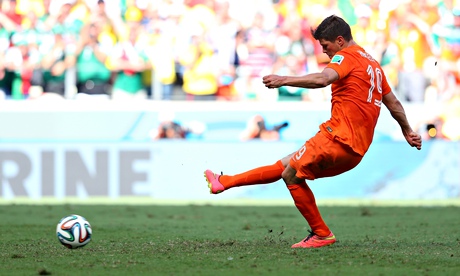Holland come from behind to snatch last-gasp victory against Mexico

This World Cup gets more dramatic by the day. Two goals in the last
six minutes, one of them a penalty in the dying moments, sent Holland
through to the quarter-finals. Wesley Sneijder and the substitute
Klaas-Jan Huntelaar scored them, but no one had been as significant as
Arjen Robben, and he it was who sprinted towards the end of the stadium
and leapt in the air, clenching his fists at the full-time whistle. It
was a run he had made over and over; he had done most to drag the Dutch
back into the World Cup.
Louis van Gaal explained how Holland had switched between formations as they chased the game but, whatever the shape, Robben stood at the heart of it. He was at the heart of the game’s decisive and controversial moment, too. The Mexico manager, Miguel Herrera, described the penalty that finally won this match as “invented”.
Robben cut inside, evaded Diego Reyes and went over Rafa Márquez’s leg. The question was whether he had been brought down or whether he had dived. This time Pedro Proença considered it a foul. Herrera did not. It had been Robben’s third dive, he said: a yellow card for the first would have prevented the next two.
Just before that, Huntelaar produced a brilliant header from Robben’s deep corner in the 88th minute, laying the ball into Sneijder’s path for a well-struck equaliser. Five minutes later he scored from the spot. On the bench they held their breath; on the pitch Huntelaar held his nerve. “He was very cool,” Van Gaal said.
“Sing, don’t cry,” runs the Mexicans’ tune of choice but there was no stopping the tears at the end. Just when they appeared to be on the edge of breaking a barrier that has stood before them for 28 years they will now be haunted for four more. Giovani dos Santos had given them the lead but for the sixth successive World Cup they have reached the knockout phase and been knocked out: Holland did to them what Bulgaria did in 1994, Germany in 1998, the USA in 2002 and Argentina in 2006 and 2010.
It hurt all the more for the way it happened and what has been denied them: if they had got through, then only Greece or Costa Rica would have blocked their way to a place in the semi-final. “If we had been knocked out by a great goal, fine, that’s football,” Herrera said. Now it is Holland who will be confident, even if Van Gaal scoffed at suggestions that they are now favourites and admitted it is unlikely that Nigel de Jong will be available after he was removed in the fifth minute.
When Mexico took the lead their grip on this game appeared firm, yet by the final whistle Holland could claim to have deserved it. For a long time it seemed there was no way past Guillermo Ochoa – there was something cruel about presenting him with the man of the match award in front of the media, the forced smile failing to hide the frustration – and for a long time the conclusion looked likely to be that Robben could not do it on his own. Help came from Huntelaar and, arguably, from the referee.
Mexico dominated the first half and went ahead early in the second, Dos Santos controlling on his chest and allowing the ball to bounce before striking a wonderful left-footed shot that went into the far corner, 25 yards away. It was his first goal at this World Cup, his first for Mexico in over a year, but it should have been his third. No linesman was going to take this moment from him but by the end the Mexicans felt that the referee had.
Holland, though, deserved praise for the way they responded, despite having to chase the game when so far there had been little sign of the energy that they might need in conditions that Van Gaal had feared would go against them. Yet they did react, both physically and tactically. In fact, the conditions may have helped: Van Gaal admitted that he used the water break to make and explain his changes.
They shifted from wing backs to 4-3-3 and then two up front playing longer towards Huntelaar. The second half would be all theirs. It had started immediately when Ochoa somehow kept out Stefan de Vrij’s close-range volley from a corner, pushing it against the post with a combination of head and hands.
Wide on the left, Memphis Depay was now running at them, more winger than wing back, but not as much as Robben. A familiar pattern emerged, a simple tactic: get the ball to Robben. He cut in and provided a pass for Sneijder, whose shot squirmed wide off Rodríguez; he then clipped a ball in that just evaded Sneijder; and soon after that he appealed for another penalty. He ran inside, lost his footing and, as he scrambled to his feet, tried to burst past Miguel Layún, lying on the floor and trying to reach the ball with an outstretched leg. Robben tumbled over his legs. He may have done so deliberately; certainly Proença was not convinced it was a foul or a dive.
Still they came and still it was Robben. A swivel of the hips and a cut-back, this time to the outside, took him away from Márquez but Ochoa saved again. Robin van Persie was withdrawn for Huntelaar and Holland became more direct. His impact would be decisive, nodding down for Sneijder to thump in the equaliser with five minutes left. There was still time for Robben to make his penultimate run of the afternoon, into the area to win a penalty. His last was a sprint to celebrate.
Louis van Gaal explained how Holland had switched between formations as they chased the game but, whatever the shape, Robben stood at the heart of it. He was at the heart of the game’s decisive and controversial moment, too. The Mexico manager, Miguel Herrera, described the penalty that finally won this match as “invented”.
Robben cut inside, evaded Diego Reyes and went over Rafa Márquez’s leg. The question was whether he had been brought down or whether he had dived. This time Pedro Proença considered it a foul. Herrera did not. It had been Robben’s third dive, he said: a yellow card for the first would have prevented the next two.
Just before that, Huntelaar produced a brilliant header from Robben’s deep corner in the 88th minute, laying the ball into Sneijder’s path for a well-struck equaliser. Five minutes later he scored from the spot. On the bench they held their breath; on the pitch Huntelaar held his nerve. “He was very cool,” Van Gaal said.
“Sing, don’t cry,” runs the Mexicans’ tune of choice but there was no stopping the tears at the end. Just when they appeared to be on the edge of breaking a barrier that has stood before them for 28 years they will now be haunted for four more. Giovani dos Santos had given them the lead but for the sixth successive World Cup they have reached the knockout phase and been knocked out: Holland did to them what Bulgaria did in 1994, Germany in 1998, the USA in 2002 and Argentina in 2006 and 2010.
It hurt all the more for the way it happened and what has been denied them: if they had got through, then only Greece or Costa Rica would have blocked their way to a place in the semi-final. “If we had been knocked out by a great goal, fine, that’s football,” Herrera said. Now it is Holland who will be confident, even if Van Gaal scoffed at suggestions that they are now favourites and admitted it is unlikely that Nigel de Jong will be available after he was removed in the fifth minute.
When Mexico took the lead their grip on this game appeared firm, yet by the final whistle Holland could claim to have deserved it. For a long time it seemed there was no way past Guillermo Ochoa – there was something cruel about presenting him with the man of the match award in front of the media, the forced smile failing to hide the frustration – and for a long time the conclusion looked likely to be that Robben could not do it on his own. Help came from Huntelaar and, arguably, from the referee.
Mexico dominated the first half and went ahead early in the second, Dos Santos controlling on his chest and allowing the ball to bounce before striking a wonderful left-footed shot that went into the far corner, 25 yards away. It was his first goal at this World Cup, his first for Mexico in over a year, but it should have been his third. No linesman was going to take this moment from him but by the end the Mexicans felt that the referee had.
Holland, though, deserved praise for the way they responded, despite having to chase the game when so far there had been little sign of the energy that they might need in conditions that Van Gaal had feared would go against them. Yet they did react, both physically and tactically. In fact, the conditions may have helped: Van Gaal admitted that he used the water break to make and explain his changes.
They shifted from wing backs to 4-3-3 and then two up front playing longer towards Huntelaar. The second half would be all theirs. It had started immediately when Ochoa somehow kept out Stefan de Vrij’s close-range volley from a corner, pushing it against the post with a combination of head and hands.
Wide on the left, Memphis Depay was now running at them, more winger than wing back, but not as much as Robben. A familiar pattern emerged, a simple tactic: get the ball to Robben. He cut in and provided a pass for Sneijder, whose shot squirmed wide off Rodríguez; he then clipped a ball in that just evaded Sneijder; and soon after that he appealed for another penalty. He ran inside, lost his footing and, as he scrambled to his feet, tried to burst past Miguel Layún, lying on the floor and trying to reach the ball with an outstretched leg. Robben tumbled over his legs. He may have done so deliberately; certainly Proença was not convinced it was a foul or a dive.
Still they came and still it was Robben. A swivel of the hips and a cut-back, this time to the outside, took him away from Márquez but Ochoa saved again. Robin van Persie was withdrawn for Huntelaar and Holland became more direct. His impact would be decisive, nodding down for Sneijder to thump in the equaliser with five minutes left. There was still time for Robben to make his penultimate run of the afternoon, into the area to win a penalty. His last was a sprint to celebrate.


Comments
Post a Comment